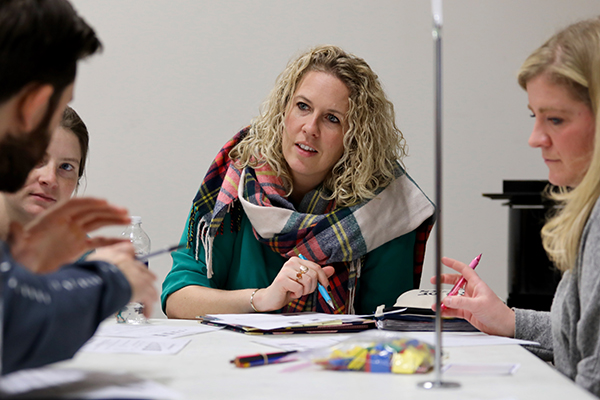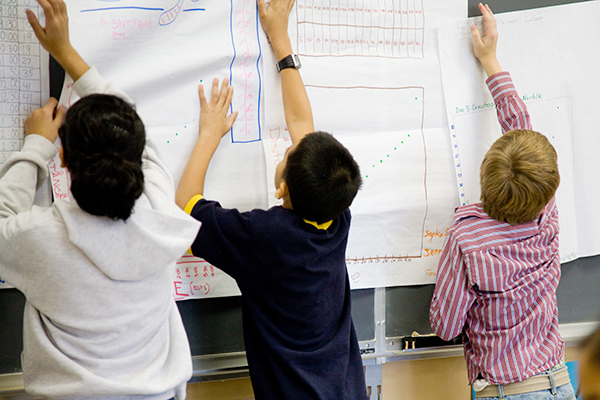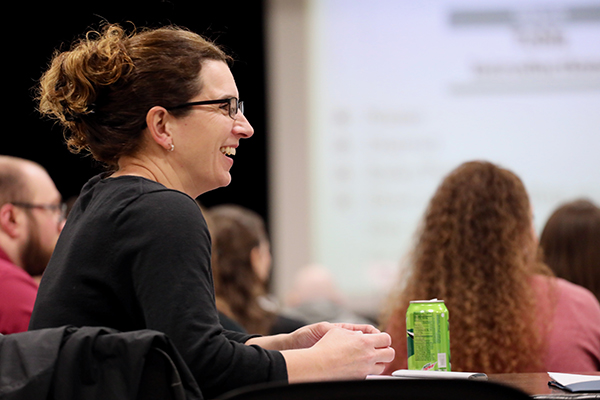
Comprehensive professional learning for math educators
We engage educators in high-quality professional learning that supports the teaching and learning of mathematics with the goal of increasing student achievement. We work to develop capacity within the organizations we collaborate with and look to expand in new directions based on the changing needs of these organizations, as well as the latest research in the field of mathematics education.
By putting research into practice, we support high-quality mathematics instruction in order to support all learners. We work to build strong working relationships among teachers, administrators, parents, students, and community members, and develop reflective practitioners with a desire to learn more, do more, and be ever better.

Math education team
Jennifer Kruger, Director
Genie Foster, Associate Director
Maryanne Maves, Associate Director
Angela Messenger, Associate Director
Melissa Staloff, Associate Director
Cynthia Carson, Coordinator

Professional learning courses
Our professional learning courses provide a space for K-12 educators to deepen their knowledge of mathematics and effective teaching practices. All of our courses engage participants in experiences as learners and as facilitators of learning. We look to evoke curiosity that creates different images and beliefs around the teaching and learning of mathematics. Through our work, participants have opportunities to examine concepts, ideas, and structures in teaching and learning mathematics while connecting to their own classroom.
We routinely design customized professional learning offerings tailored to district needs and initiatives. Some examples of current and past offerings include:
Orchestrating Mathematical Discussions, based on the work of Margaret Smith and Mary Kay Stein described in their book, 5 Practices for Orchestrating Productive Mathematics Discussions (NCTM, 2018)
Effective Teaching and Learning through the Standards for Mathematical Practice, based on the EDC project funded by the National Science Foundation, Implementing the Mathematical Practice Standards (Educational Development Center, Inc. 2016)
Developing Mathematical Mindsets, based on the work of Jo Boaler as described in her book, Mathematical Mindsets (Jossey-Bass, 2016)
The Eight Effective Mathematics Teaching Practices, based on Principles to Actions, Ensuring Mathematical Success for All (NCTM, 2014) and Taking Action, Implementing Effective Mathematics Teaching Practices (Smith (Ed.), 2017)

Teaching labs
Teaching labs are a vehicle to provide a shared experience in order to engage in a professional conversation about mathematical content, instructional practices and student thinking. In a teaching lab experience, a facilitator plans a lesson using instructional practices connected to other professional learning experiences and/or district initiatives. A team of teachers will engage then engage with the facilitator in the following phases:
- A planning session to consider the “big ideas” of the lesson, anticipate student thinking, and contribute to the lesson design.
- Observation of the mathematics lesson taught in a classroom by the facilitator with participants collecting evidence with a particular focus.
- A debriefing discussion to examine student work and thinking; reflecting on instructional moves and their impact.
Teaching labs provide a space for educators to engage as learners of our craft and of student learning. Lab experiences are focused on a specific lesson, task or instructional move that highlights effective teaching practices and student thinking as it plays out live in the classroom.

Content-focused coaching
We engage one-on-one with teachers who are looking to deepen their understanding of mathematics teaching and learning and shift their practice to improve each student’s experience. As partners in the classroom, the teacher and the coach together consider what is currently happening in the classroom, explore implementation of new ideas, and make space for growth and change – both for the teacher and the students. Each coaching cycle follows a three-part model in which the teacher and coach plan, implement and reflect on a lesson as a team.

Photo courtesy of Phelps-Clifton Springs Central School District
Leadership development in mathematics education
We engage with mathematics coaches and instructional leaders, either individually or in small groups, across all aspects of their roles. We work to deepen and refine their content focused coaching practices, support them in designing and implementing professional learning experiences, and partner with them to examine curricular decisions, for their particular contexts.

Online learning
Our online learning opportunities allow conveniences and opportunities for teachers that go beyond what face-to-face professional learning sessions can provide. These opportunities can adapt to a teacher’s busy schedule, draw on expert resources, and provide work-embedded support, which may offer more people more access by reducing barriers of location and time. Our online learning experiences offer opportunities for teachers to engage in rich mathematical tasks and discussions, as well as to help support a teacher’s ability to notice and respond to student thinking.
Online content-focused video coaching for mathematics
Our online content-focused video coaching model allows access to expert resources and reduces barriers of location. In addition, it allows coaches and teachers to access professional learning despite their busy schedules. This model of coaching is grounded in collaborative dialogue between a teacher and expert mathematics coach partner to translate professional development experiences into effective instructional practices. Our content-focused video coaching model closely follows the three-part coaching cycle with synchronous planning and reflecting sessions, yet differs through the use of video analysis of the teacher’s lesson implementation. Online coaching is a way to get personalized support specific to each teachers’ context.
Online professional learning courses
Our online professional learning courses capitalize on the capabilities of communicative technology to build collaborative learning communities and provide opportunities for active engagement among participants. Participants in our online courses meet synchronously as a group using the video conferencing platform, Zoom. This platform allows for seeing all participants’ faces during both synchronous whole group discussions and small group interactions. Our courses are designed to engage teachers in experiences that support the deepening of both mathematical content and pedagogical knowledge.
